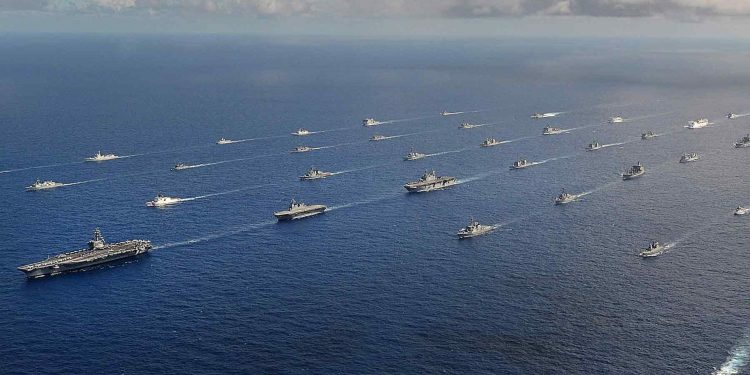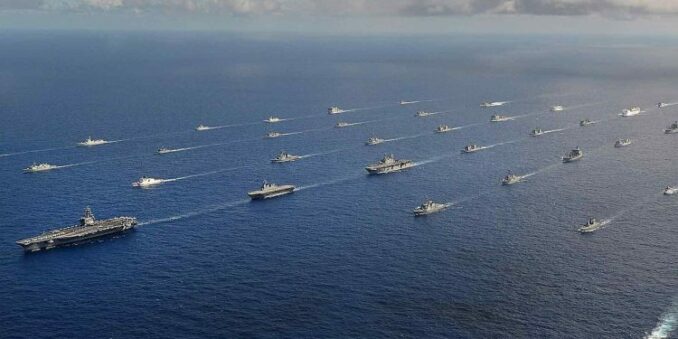

NATO partners, including the U.S., kick off the 12-day maritime exercise “Neptune Strike ’22” in the Mediterranean Sea, Jan. 24.
By Manlio Dinucci
Published Jan. 25 in Il Manifesto, in the author’s “Art of War” column.
“As a precautionary measure against a possible Russian invasion of Ukraine,” the U.S. State Department ordered the evacuation of family members and part of the staff from the U.S. Embassy in Kiev, which with 900 officials is among the largest in Europe, and raised the warning to U.S. citizens not to go to Ukraine to level 4 risk, the maximum. Immediately afterwards the British Foreign Office announced, with the same motivation, the withdrawal of staff from the British Embassy in Kiev.


NATO partners, including the U.S., kick off the 12-day maritime exercise “Neptune Strike ’22” in the Mediterranean Sea, Jan. 24.
These operations of psychological warfare, aimed at creating alarm about an imminent Russian invasion of Ukraine and the three Baltic republics, set the scene for a further and even more dangerous U.S.-NATO escalation against Russia.
The White House announced that President [Joe] Biden is considering “deploying several thousand U.S. troops, warships and aircraft to NATO countries in the Baltics and Eastern Europe.” Initially, 5,500 U.S. troops are expected to arrive, joining the 4,000 already in Poland and followed by thousands more, extending their permanent deployment to the Baltic, as Latvia has requested.
Special rail convoys are already transporting U.S. tanks from Poland to Ukraine, whose armed forces have been trained for years and are, in fact, commanded by hundreds of U.S. military advisers and instructors, flanked by others from NATO. Washington, which last year provided Kiev with weapons for the official amount of $650 million, has authorized Estonia, Latvia and Lithuania to transfer U.S. weapons in their possession to Ukraine, in particular Javelin missiles. Other armaments are provided by Great Britain and the Czech Republic.
NATO reported that the European countries of the Alliance are putting their armed forces in a state of operational readiness and deploying other warships and fighter planes to Eastern Europe. Italy, with Eurofighter fighter-bombers, has taken command of NATO’s “enhanced air policing” mission in Romania. France is ready to send troops to Romania under NATO command. Spain is sending warships in NATO naval forces and fighter-bombers to Bulgaria. The Netherlands is preparing to send F-35 fighters to Bulgaria. Denmark is sending F-16 fighters to Lithuania.
Yesterday, in the Mediterranean Sea, the great NATO naval exercise Neptune Strike ’22 began, under the command of Vice Admiral Eugene Black, commander of the Sixth Fleet with headquarters in Naples Capodichino and base in Gaeta. The exercise, which lasts 12 days, involves the U.S. nuclear aircraft carrier Harry Truman with its battle group, including five missile launchers ready for nuclear attack to “reassure the European Allies especially those threatened by Russia on the eastern front.”
Immediately after the NATO Neptune Strike ’22, the exercise Mission Clemenceau ’22 will take place in February. It will involve, in an “operation of three aircraft carriers,” the French nuclear-powered Charles de Gaulle with its battle group, including a nuclear attack submarine, which will enter the Adriatic; the Harry Truman with its battle group; and the Italian aircraft carrier Cavour with the F-35 on board. This exercise, of course, is also directed against Russia.
While NATO demands that Russia “de-escalate,” warning that “any further aggression will involve a high cost for Moscow,” the foreign ministers of the European Union — meeting in Brussels and connected by teleconference with U.S. Secretary of State Anthony Blinken — have decreed yesterday other measures against Russia.
The European Union of 27, of which 21 belong to NATO under U.S. command, echoed NATO’s warning to Russia, declaring that “any further military aggression against Ukraine would have very serious consequences for Russia.” In this way the EU participates in the strategy of tension, through which the U.S. creates splits among European countries to keep the EU under U.S. influence.
As we observe the ongoing negotiations between the United States and Iran, we, the undersigned,…
Hamas issued the following statement on April 24, 2025, published on Resistance News Network. The…
By D. Musa Springer This statement is from Hood Communist editor and organizer D. Musa…
Portland, Oregon On April 12 — following protests in Seattle and elsewhere in support of…
This statement was recently issued by over 30 groups. On Friday, March 28, Dr. Helyeh…
When Donald Trump announced massive tariffs on foreign imports April 2, Wall Street investors saw…